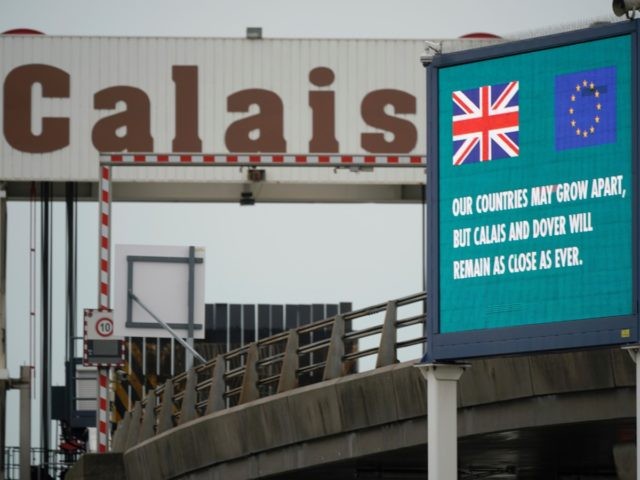Armed Albanian people-smuggling gangs are running a new ‘Jungle’ migrant camp in Calais, France, that is packed with over 1,000 people who buy kayaks and surfboards to attempt to cross the English Channel.
Amidst an uptick in security checks of lorries entering the United Kingdom, many migrants are increasingly attempting to illegally cross the Channel, with over 2,000 people already reaching British shores this year, compared to 1,890 for the whole of last year.
The Albanian gangs will meet the migrants at night, providing them with a map to where their vessel is buried along the coast. The current rate for a seat on an inflatable Zodiac boat is between £3,000-£5,000. It costs between £500-£800 to purchase a windsurfing board or a kayak.
A man from Eritrea told a reporter from The Times: “Be careful. The Albanians control this camp. They have guns and knives. They won’t like you asking questions.”
French authorities have said that many migrants die in the process, often disappearing after being chopped up by the propellers of large shipping vessels.
Ramiz Neyazi — an Afghani migrant who claimed to be 17 years old — told the newspaper that the journey is also very dangerous. He said: “Many people from here have died in the sea. They go, and nobody hears from them again.”
The migrant said that he had crossed through “Pakistan, Iran, Turkey, Greece, North Macedonia, Serbia, Bosnia, Croatia, Slovenia, Italy, and France” in an attempt to get to the UK, despite international rules for asylum seekers that mandate refugees remain in the first safe country they reach.
The former prime minister of Australia, Tony Abbott, warned the UK might face its own migrant crisis unless it turns the boats back in the English Channel. https://t.co/n1AUmB8wTh
— Breitbart News (@BreitbartNews) June 1, 2020
The president of the Société Nationale Sauvetage en Mer, the French equivalent to the Royal National Lifeboat Institution, Gérard Barron, said: “It is extremely dangerous to go to sea when you don’t know anything about sailing. The English Channel is the busiest waterway in the world.
“They are crossing in dinghies and on surfboards, which quite frankly should not be in the water. People traffickers are completely ruthless. There are many more people being lost at sea than we realise. This is because of the strong currents in the Channel and in particular the North Sea.
“It is difficult to prove how many are dying because in the majority of cases the migrants are chopped up into little pieces by the propellers of the large ships and boats, and nothing of them remains.”
A senior French Border official noted that the tactics used by the mostly Albanian people-smuggling gangs are increasingly sophisticated, often launching several boats at the same time from different locations along the Calais coast in order to stymie attempts to prevent crossings.
“The smugglers will organise simultaneous departures along the entire Côte d’Opale, from Boulogne to Dunkirk, sometimes as many as 15 boats at the same time,” the border official said.
“Vessels which are in a poor condition or equipped with poor outboard motors can get into difficulty in the Channel and require rescue. While the French and English patrol boats are busy with that, the high-paying customers will zoom past on the faster and better-equipped boats. It shows a level of sophistication we haven’t seen before,” he added.
The border official said that migrants will often take extreme measures to deter the French navy from picking them up, including dousing themselves and their boats with petrol, threatening to set themselves on fire if intercepted. Migrants have also threatened to toss women and children into the sea to keep would-be rescuers at bay until they reach UK waters.
100 Illegal Boat Migrants Escorted Again Into British Waters by the French Navy https://t.co/0v9HFMHRsR
— Breitbart London (@BreitbartLondon) June 4, 2020
In 2016, French officials destroyed a previous incarnation of the ‘Jungle’ migrant camp in Calais. The camp was home to some 10,000 migrants during the height of the European Migrant Crisis.
The camp was plagued by instances of violence, forcing police to declare some areas of Calais as “no go zones” after dark.
In October of 2016, three migrants robbed and raped at knifepoint a female reporter while she was serving as a translator for a French film crew that was documenting the rampant child abuse in the camp.
Drivers attempting to enter the area were frequently attacked with bats and knives by migrant inhabitants of the camp, with some even threatening people with chainsaws.
Since then, Britain has spent over £150 million in Calais, Dunkirk, and the entrance to the Eurotunnel at Coquelles to deter waves of migrants attempting to reach the UK. The British government has paid for the installation of fences, CCTV security cameras, and the construction of a concrete wall to prevent migrants from clandestinely boarding lorries.
This, however, has not mitigated the growing crisis. Home Secretary Priti Patel has made pledges to the British public that the government would stop illegal crossings, yet this promise has yet to be fulfilled. As to the exact number of attempted boat crossings of the Channel, the Home Office said that “We don’t publish them.”
'Beginning of an Invasion' – UK Boat Migrant Influx Hits New Record https://t.co/2hlpa39ZE7
— Breitbart London (@BreitbartLondon) May 10, 2020
Follow Kurt on Twitter at @KurtZindulka

COMMENTS
Please let us know if you're having issues with commenting.